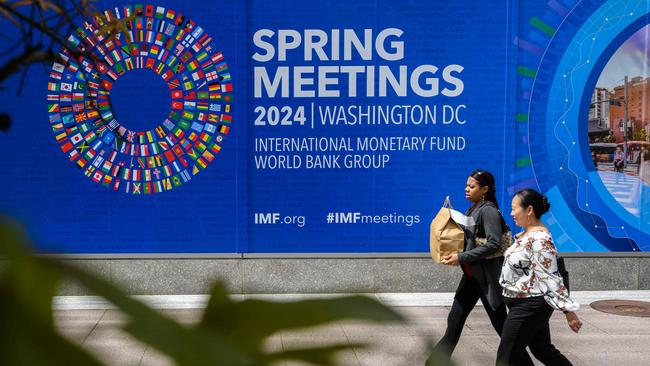International Monetary Fund pours cold water on a pre-election cash splash
The Washington-based fund says an unexpected increase in government spending risks prolonging already persistent inflation, forcing the Reserve Bank to keep interest rates higher for longer.

The International Monetary Fund has warned Anthony Albanese against a pre-election cash-splash, saying further increases in government spending would prolong inflationary pressures and force the Reserve Bank to hike interest rates further.
The Washington-based fund encouraged the Albanese government to pare back tax breaks on investment properties as part of a “holistic package” to address the housing shortage, as Jim Chalmers awaits Treasury advice on the impact of reforms to negative gearing and capital gains tax concessions.
With the Treasurer fending off claims that Labor’s May budget was undermining the RBA’s inflation fight, the IMF said the federal budget was expected to deliver a “positive fiscal impulse” this financial year, meaning the change in spending would bolster demand and economic activity at the same time the central bank was trying to slow the economy.
The IMF found the federal government’s recent round of cost-of-living relief in the May budget, which included a $300 energy bill rebate for every household, “may inject some additional stimulus into the broader economy”.
Meanwhile, state and territory budgets had proven to be “more expansionary than expected”, the IMF’s assessment found, because of cost-of-living handouts and increased infrastructure spending.
“Fiscal policy should support disinflation as the economy continues to grapple with supply capacity constraints,” the IMF said in its preliminary annual assessment of the Australian economy, released on Thursday.
With the RBA warning that inflation remains too high to press ahead with rate cuts, Challenger chief economist Jonathan Kearns said the IMF’s report demonstrated there were limited options for Labor and the Coalition to announce a round of “sweeteners” in the lead-up to the election.
“The RBA is still running restrictive monetary policy and so anything coming from the government that is stimulatory – which any election spending would be – is not particularly helpful,” Dr Kearns said.
Amid continued voter disquiet over the impact of elevated inflation on household budgets, the Treasurer has foreshadowed further cost-of-living support ahead of the next election, including an extension of power bill relief.
However, the IMF said any extra support should be targeted to the most vulnerable households so as not to ensure a broader loosening of the fiscal purse strings. Dr Chalmers has previously defended Labor’s power bill rebate, saying universal support was the most effective method of providing relief to middle-income earners.
With the federal budget expected to record a $28.3bn deficit in the current financial year due to lower commodity prices and an expected weakening jobs market, UNSW economics professor Richard Holden said promising big spending initiatives would be difficult.
“It’s looking like a pretty big deficit and so adding more to that with election commitments is not going to be great. Notwithstanding that, both sides will make various promises I’m sure,(but) it’ll probably curtail their ability to do it,” he said.
Despite claims by Dr Chalmers and other senior Labor figures that the RBA was “smashing the economy” via its aggressive run of rate hikes, the IMF stated the central bank’s current interest rate settings were “appropriate”.
However, if government spending was stronger than expected, or supply chains become entangled, the IMF warned the central bank could be thrown off its current course.
“This may in turn raise prospects of higher for even longer interest rates, with implications for consumption and investment,” it said.
“Should disinflation stall, monetary policy may need to be further tightened, supported by tighter fiscal policy while nurturing growth, and preserving targeted support to vulnerable households amid rising living costs.”
Speaking on Thursday, Dr Chalmers, who has rejected claims that government spending is fuelling inflation, said the report was an endorsement of the Albanese government’s “responsible economic management”.
“The government’s primary focus is to get on top of our inflation challenge without ignoring the risks to growth and the IMF has backed this strategy,” Dr Chalmers said.
Seizing on the IMF report, opposition Treasury spokesman Angus Taylor claimed it showed Labor’s spending had exacerbated inflation.
“Today’s IMF statement confirms what the Coalition has said since the election – Labor’s big spending means Australian families are facing higher prices, higher taxes, and higher interest rates for longer,” Mr Taylor said.







To join the conversation, please log in. Don't have an account? Register
Join the conversation, you are commenting as Logout